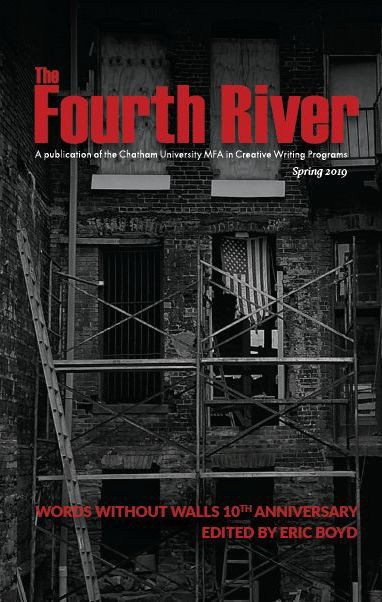By JL Silverman
Would you accept an opportunity to walk into the Allegheny County Jail, face prisoners, ask them to open a notebook and write?
Chatham University’s Words Without Walls (WWW) initiative, which is part of the MFA Writing program at Chatham, does just that. It recently has been gaining media attention and has been featured at local events.
Graduate students, faculty and alumni teach four classes a semester at both the Allegheny County Jail and Sojourner House, a residential drug and alcohol treatment facility for mothers and their children.
Independent writer Sandra Gould Ford started the writing program in 2005. She handed the baton to Chatham 10 years ago. The University formalized and expanded the program into WWW, headed by Sheryl St. Germain, who extended it with Sojourner House.
Almost 70 Chatham MFA students have taught in the WWW program. Students learn how to teach within the jail structure by participating in a workshop forum.
More than 3,000 people have participated in the program, and four of the incarcerated writers have received PEN America Prison Writing awards, one of the highest honors in writing.
For the Chatham student, it creates an opportunity to have “proximity to someone who is different, and not just one person, and not just once,” said Professor Sarah Shotland. She has been with the program since the beginning of Chatham’s affiliation with Allegheny County Jail.
“Overall, I had great students,” said Ryan King, a Chatham MFA 2019 graduate and WWW teacher. “I loved to listen to their responses to the text — how their histories related to our reading materials. I’ve heard poems at the jail that you’d think were written at the graduate school level.”
The students are taught how to encourage respectful debate, as well as listen and find out about the lives of the incarcerated students.
“Sometimes the students would talk in class. I felt reluctant to stop their conversations because the students are constantly being told what to do from other people in authority. That always felt tricky,” King said.
Chatham students are reminded that along with building community, curiosity and critical thinking, they need to be flexible in their lesson planning. Groups may arrive or depart at staggered times and classes may be cut short or cancelled last minute.
They discovered sometimes inmates couldn’t access books from the prison’s library due to a lockdown.
The MFA program at Chatham believes that teaching writing skills helps nourish the mind. Writing has the ability to empower and to give inmates the opportunity to reflect on the past and reimagine the future, Shotland said.
Shaka Sengher spoke on the Chatham University’s Shadyside campus Thursday, Sept. 19 about his writing and criminal justice reform. He’s a self-taught writer who developed his skills while in solitary confinement. He was not part of Chatham’s WWW program.
In his memoir “Writing My Wrongs: Life, Death and Redemption in an American Prison,” Sengher talked of his journey of discovery through journal writing. He said that the act of writing, then examining his journals, helped him find compassion. By writing and tracking his changes he forged himself into a new man different from the angry one who was to serve a life sentence
In tribute to the 10th anniversary of the WWW program, Chatham’s literary magazine The Fourth River Journal dedicated a section to WWW in the 16th edition.

Eric Boyd was one of the first students of the WWW program in 2009 during his incarceration at Allegheny County Jail. Ten years after his incarceration, Boyd was invited to guest edit the special edition.
“Writing is a generative skill that improves every facet of one’s life,” Boyd wrote in the Journal’s introduction. He concluded with, “I find no solace in my pain, but, if we’re being honest with each other, I have caught gleams of comfort from witnessing yours.”
At the City of Asylum on Pittsburgh’s North Side, notable Pittsburgh writers read 13 works by incarcerated writers in September. Hearing one incarcerated writer’s description of the “Living Grave” was both shocking and illuminating. Diana Nelson Jones of the Pittsburgh Post-Gazette attended the event. What drew her was her experience of having a pen pal in prison who is serving a life sentence. Nelson Jones published her response in a column on Sept. 9.
Those in the WWW teaching program are told “you will leave with more questions than answers, contradictions; you may feel angry, hopeful, devastated. You will hear many stories,” Shotland said.
Rachel Carson left a legacy of social consciousness building sustainable safe communities, Shotland added. This program is another way Chatham students carry on her legacy.

